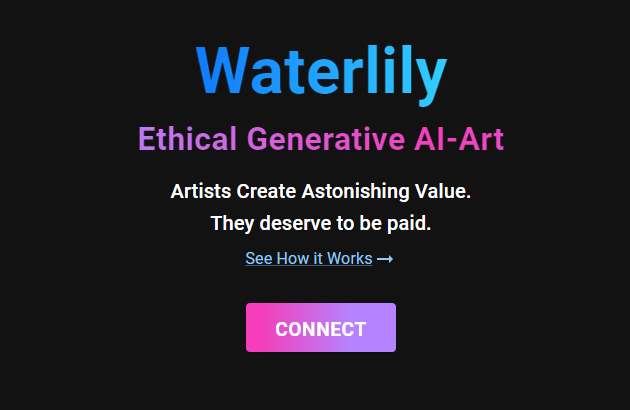 AI
AI
 AI
AI
 AI
AI
The rise of artificial intelligence has also prompted more ethical concerns around copyright and fair use, given that generative AI such as Open AI LP’s ChatGPT as well as Stable Diffusion are trained on existing content such as text, images and video.
On the one hand, the artist Grimes has embraced AI and has said that she’s happy for anyone to use her voice as long as they share revenues from AI-generated works, but other artists are suing over the use of their art to train AI models.
The law still has a long way to go to catch up with the rapid emergence of AI, but a newly released service today is aimed at addressing the use of artist content in AI creation by enabling direct coordination and payments to artists whenever their style is used to create generative images.
Called Waterlily, the service from Protocol Labs Inc., Expanso Inc. and the Filecoin Foundation is being pitched as an ethical alternative to existing image generation tools that are claimed to “exploit styles, images and likenesses without proper attribution, consent, or payment.” Waterlily introduces what is claimed to be an “ethical, efficient and equitable rails alternative for the AI-generated art world.”
The idea is that people can use Waterlily to create AI images while respecting the artists whose works were used by ensuring they’re paid. With Waterlily, users can enter a text prompt, select an artist and pay a small fee for the generative art produced by the platform. It takes the text prompt and artist style selection, creates images and returns them to the user for download.
Waterlily’s AI model also differs in that it uses only the works of living artists registered on the site or works of artists that have entered the public domain. With living artists, Waterlily collects fees paid by users, deducts a small share of the running costs of the service and then pays the remaining directly to the artist. In the case of public domain works, any fee collected by Waterlily, minus computation costs, is donated directly to a charity championing support for creators in the digital realm.
The service uses a Stable Diffusion model, with neither artists nor users needing to have any programming knowledge. Artists can simply upload their works using standard tools and users can leverage the intuitive interface to create their own custom generative images.
“Generative AI has been transformative in allowing users to create images in a variety of styles,” explained Alison Haire, project lead at Waterlily. “But the current standard of generative AI tools often uses pre-existing images without proper attribution, consent or revenue given to the original creator.”
Claiming that training AI models are problematic for artists, Haire added, “Waterlily was created to address this problem and allows artists to opt into AI-art derivatives by securely and privately uploading their images to a service that trains a model in their style.”
Support our mission to keep content open and free by engaging with theCUBE community. Join theCUBE’s Alumni Trust Network, where technology leaders connect, share intelligence and create opportunities.
Founded by tech visionaries John Furrier and Dave Vellante, SiliconANGLE Media has built a dynamic ecosystem of industry-leading digital media brands that reach 15+ million elite tech professionals. Our new proprietary theCUBE AI Video Cloud is breaking ground in audience interaction, leveraging theCUBEai.com neural network to help technology companies make data-driven decisions and stay at the forefront of industry conversations.